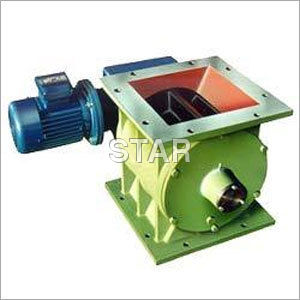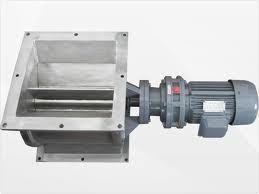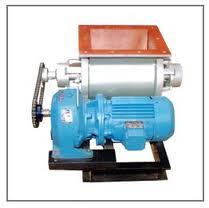
Rotary Vane Feeder
Product Details:
- Efficiency (%) 85%
- Temperature Range Up to 250C
- Installation Guideline Mount horizontally, ensure proper sealing and alignment
- Frequency 50/60 Hz
- Speed 25 RPM
- Motor Power 1.5 kW / 2 HP
- Source Manufacturer
- Click to View more
Rotary Vane Feeder Price And Quantity
- 1 Kilograms
Rotary Vane Feeder Product Specifications
- Mount horizontally, ensure proper sealing and alignment
- 700 x 450 x 400 mm
- 3 TPH
- Rotary Vane Feeder
- 1.5 kW
- Mild Steel
- 85%
- 135 kg
- Rotary Airlock Feeder
- Up to 250C
- PLC Control
- Automatic
- Powder Coated
- Manufacturer
- Gearbox, Motor, Gasket
- 25 RPM
- 50/60 Hz
- 1.5 kW / 2 HP
- Electric
- No
- Blue & Grey
- Automatic
- 2 HP
- Dust Handling, Pneumatic Conveying, Bulk Material Feeding in industrial plants
- 10 units/month
- Chain Drive
Rotary Vane Feeder Trade Information
- All India
Product Description
Backed by rich industry experience and in-depth market domain, we are involved in manufacturing, exporting and supplying a wide range of Rotary Vane Feeder. Manufactured by our diligent team of professionals and by inculcating sophisticated techniques at our high-end production unit, offered feeder is made available in a spectrum of specifications in line with the desired need of the customers. Offered feeder is extensively used in various industrial and agricultural applications for material handling purposes. Also, we provide this Rotary Vane Feeder at pocket friendly prices to the clients.
- Operational fluency
- Longer service life
- Cost-effective performance
- Ruggedness
Product details
| Material | Stainless steel |
| Brand | Star Material |
| Capacity | 2-70 t/h |
| Power | 150 cu. ft. to 800 cu |
| Weight | 300-800 kg |
Maximum Efficiency and Durability
This rotary vane feeder is engineered for continuous operation with its 85% efficiency and robust powder-coated mild steel body. The double lip seal and heavy-duty ball bearings protect against material leakage and wear, ensuring reliable performance even in demanding environments. The feeder maintains steady function under pressures up to 1 bar, and its 8 mm housing adds longevity.
Easy Maintenance and Operation
Maintenance is straightforward thanks to the removable top cover, which allows convenient access to the rotor and vanes for inspection or cleaning. Grease lubrication points are strategically placed to ease maintenance routines, reducing downtime and enhancing overall productivity. The user-friendly PLC control system streamlines automation for seamless integration into plant operations.
Versatile Industrial Applications
Designed to serve industries ranging from cement to food processing and chemical manufacturing, this rotary airlock feeder manages bulk material feeding, dust handling, and pneumatic conveying. Its 200 mm flange and inlet/outlet size make it adaptable to various material transfer lines, while its precise construction ensures reliable operation in multiple industrial settings.
FAQs of Rotary Vane Feeder:
Q: How is the rotary vane feeder installed for optimal performance?
A: For best results, mount the rotary vane feeder horizontally, ensuring proper alignment and sealing between the feeder and connected ducts. Proper installation is crucial for maintaining pressure resistance up to 1 bar and optimal material flow.Q: What materials can the rotary vane feeder handle efficiently?
A: This feeder is designed for handling bulk powders and granules commonly found in cement, food processing, chemical, and power plant industries. Its robust rotor and eight vanes enable smooth conveying of dust, powders, and similar materials under varying temperatures up to 250C.Q: When should routine maintenance be performed on the feeder?
A: Perform regular maintenance depending on usage intensitytypically monthly inspections for lubrication and visual checks of seals and vanes. The grease lubrication points and removable top cover simplify cleaning and component replacement, helping to sustain peak performance.Q: Where can this rotary vane feeder be used in an industrial setup?
A: This feeder is ideal for integration in pneumatic conveying systems, dust collection units, and bulk feeding lines within cement, food, chemical, and power plants. Its 200 mm inlet/outlet and rugged build adapt well to various transfer and handling systems.Q: What benefits does the double lip seal and heavy duty ball bearing provide?
A: The double lip seal minimizes dust and material leakage, improving airlock performance, while the heavy duty ball bearing ensures smooth operation and extends the feeders service life by reducing wear under regular industrial loads.Q: How does the PLC control system enhance feeder operation?
A: The PLC system provides consistent and automated control over the feeders operations, optimizing speed and throughput. Automation increases precision in material feeding while reducing manual intervention and potential errors.
Price:
- 50
- 100
- 200
- 250
- 500
- 1000+

 Send Inquiry
Send Inquiry


